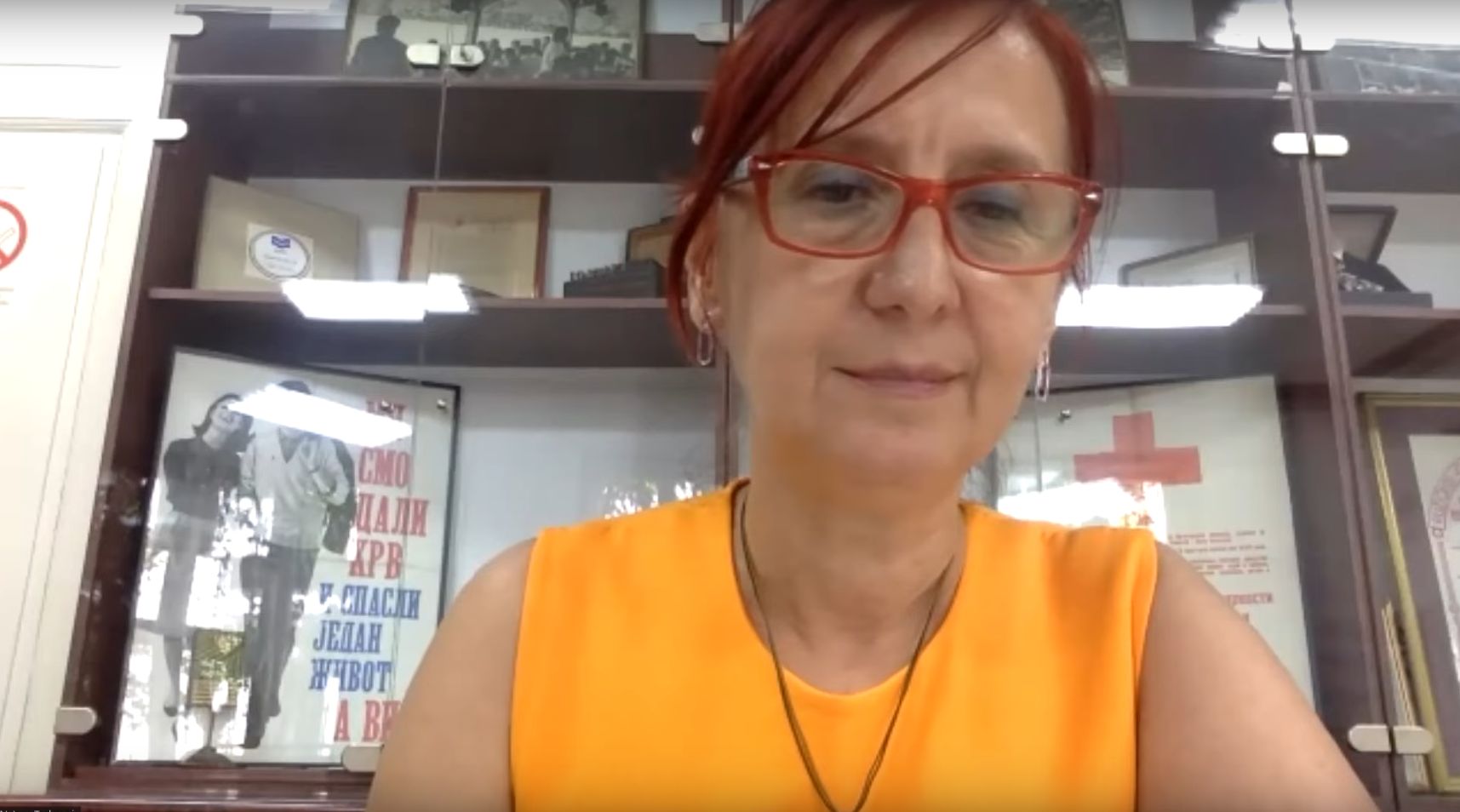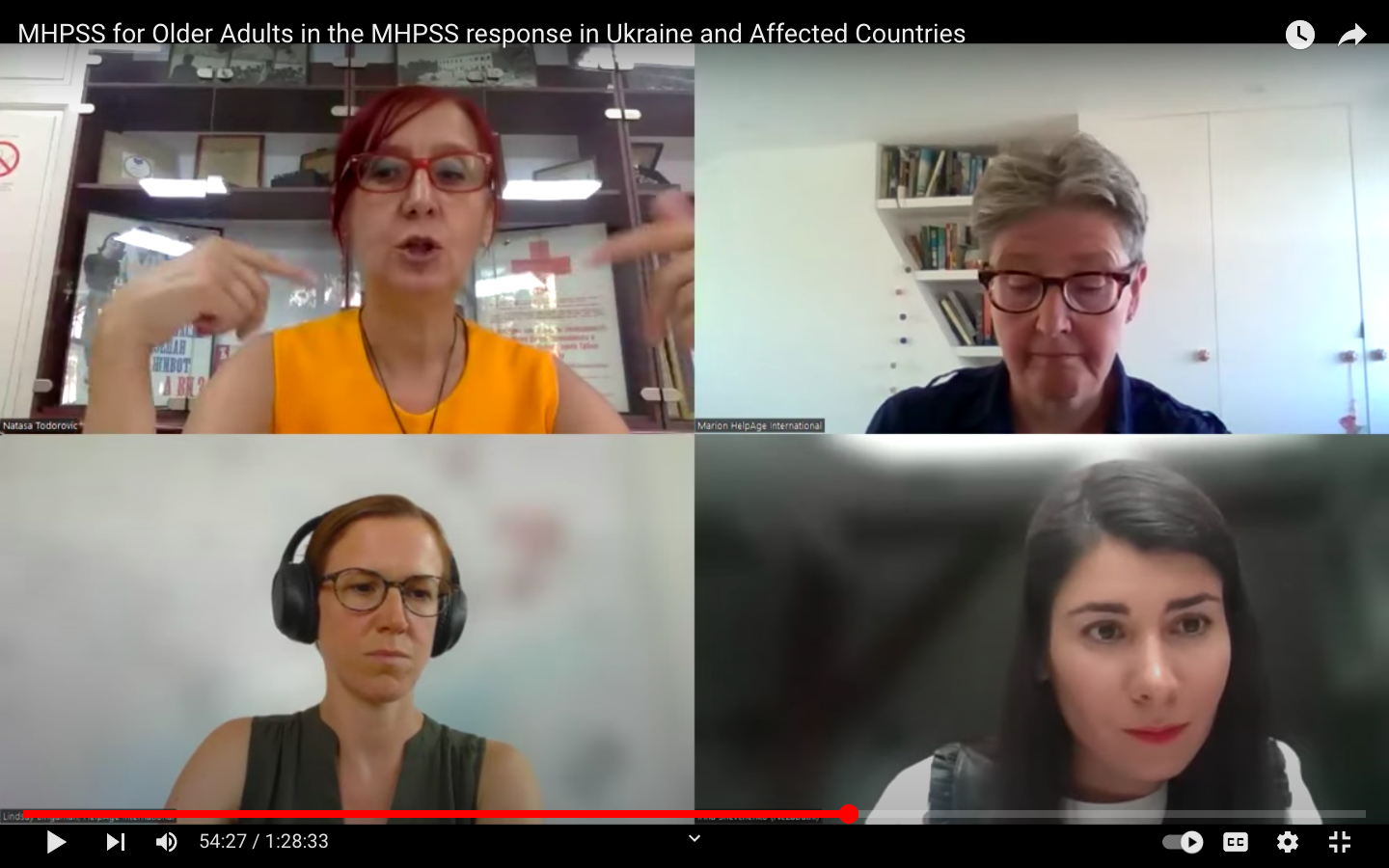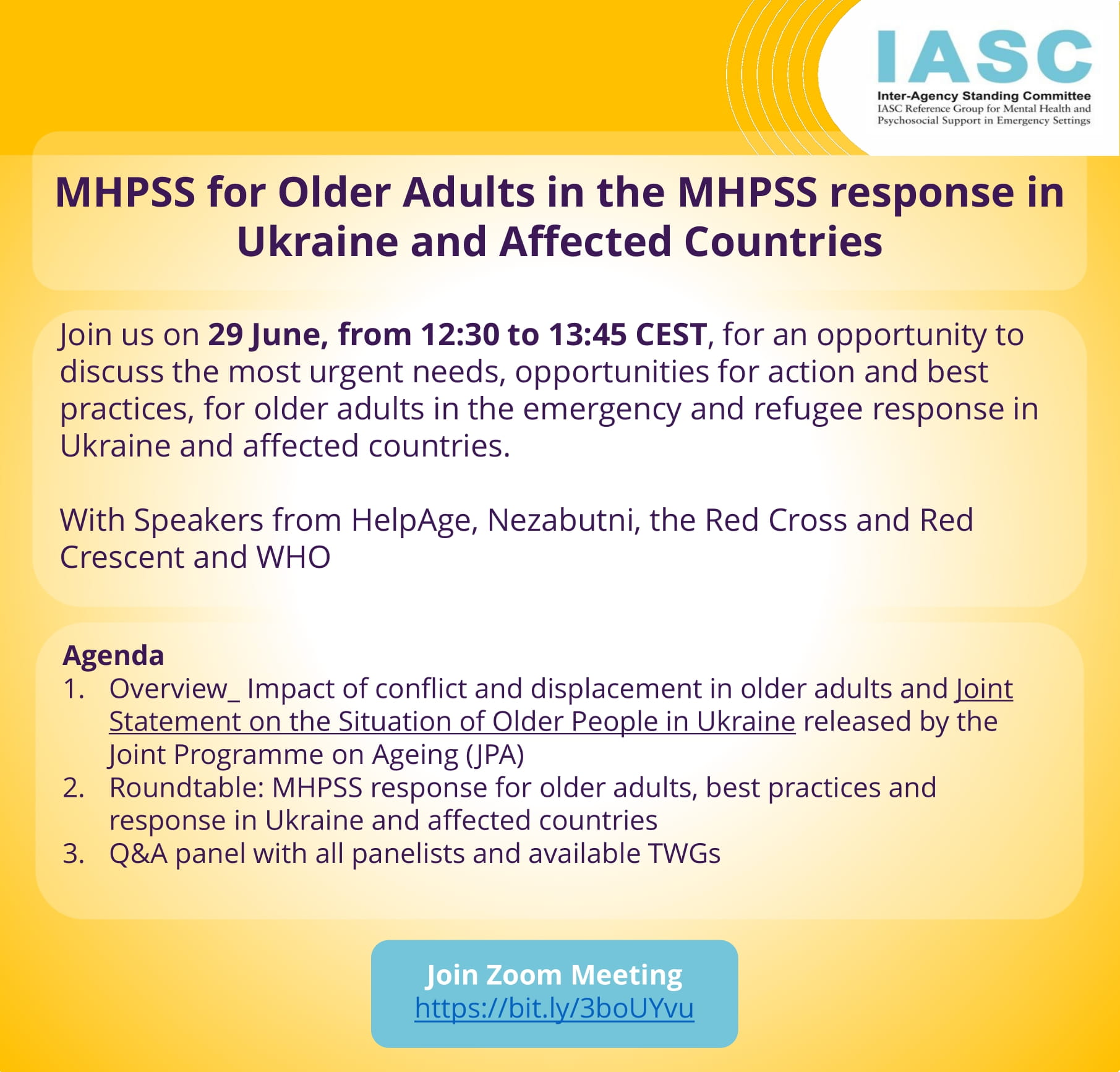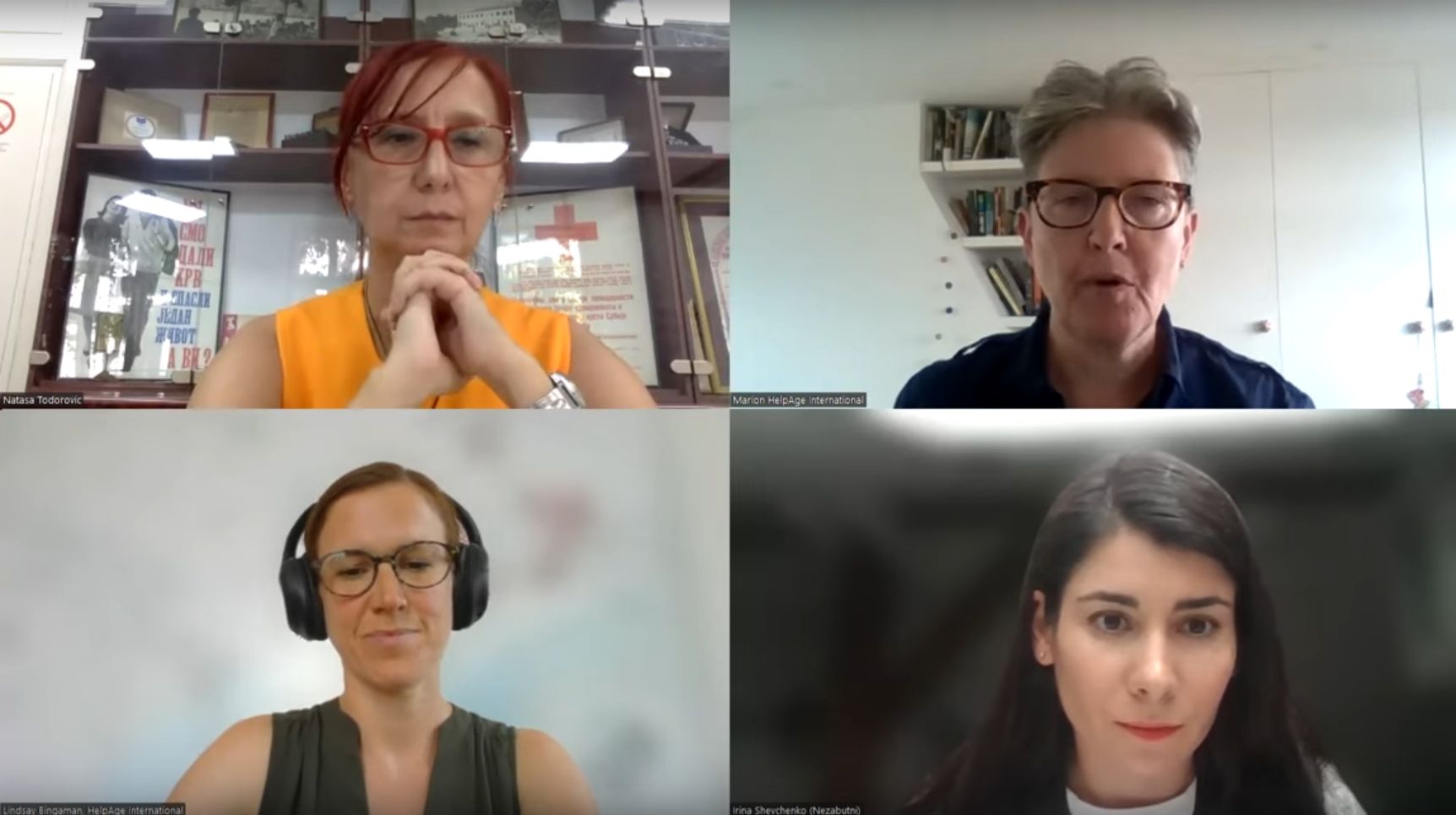IASC MHPS RG Global Call Ukraine and affected countries 28-06-22 MHPSS for Older Adults

IASC MHPS RG Global Call Ukraine and affected countries 28-06-22
MHPSS for Older Adults
The Intersectoral working group organized a webinar on the topic of older persons in conflicts with a special emphasis on the war in Ukraine. At the invitation of Dr. Carmen Valle-Trabadelo, a co-chair of the Intersectoral Working Group for Psychosocial Support (IASC MHPSS RG), and associate of the Reference Centre for Psychosocial Support of the International Federation of Red Cross and Red Crescent Societies, Nataša Todorović, expert and psychologist at the Red Cross of Serbia participated in this webinar. Each of the participants answered several questions, and here are the answers given by Nataša Todorović:
What are the main considerations for older persons when it comes to conflicts, that commonly get overlooked, as exemplified by the Ukraine conflict?
Conflicts are complex situations by their very nature. For older persons these are complex and multifaceted situations due to a number of different factors. The risks that older persons are exposed to in conflict situations are various and differing from person to person and from person to group due to the heterogeneous nature of this population. There are at least two main issues to have in mind in such situations. The first is that there are still widespread ageist prejudices in the society, some of which even have a positive spin, that ultimately are internalised even by many older persons themselves. Relief response unfortunately relies on these ageist stereotypes and concepts where older persons are seen as more expandable or even less worthy of the relief resources than other generations.
The second issue has to do with the architecture of the relief response itself. The needs of older persons are met by different agencies who do not necessarily share or centralise important information and then the relief effort does not have a reliable and updated data on which to be based. Older persons therefore can easily fall through the cracks, with many of their specific needs left unmet in conflict periods. Even when being reached by relief efforts, it may happen that majority of the generalised relief assistance simply does not meet their needs. Only since 2018 there has been an effort to standardise relief and humanitarian efforts aimed at older persons and therefore we currently have “Humanitarian inclusion standards for older people and people with disabilities”. But this needs to be applied with much more determination in all conflict situations and emergencies worldwide.
Overreliance on digital technology, especially for communication is another barrier that is often overlooked. It is true that many older persons use digital communication technology in their daily lives, but a non-trivial part of this population does not. This may be because of lack of education or because of not having access to technology itself but it means that a significant number of older persons may miss vital information or can be cut off from different kinds of support. Therefore, it is important to always ensure use of different channels of communication in parallel as to avoid excluding those who may be the most in need.
Frequently, we can see that while others evacuate, older persons will stay in the conflict zones, for a number of reasons that all have to do with ageist prejudice and social norms. Both the society and often older persons themselves tend to think this way and then older persons are left behind in conflict zones where the possibility of getting support is low. It should not be overlooked that one reason for this is that older persons often have stronger ties to the land or household and they are often afraid that their livelihood will be destroyed if they leave. So to preserve land or livestock they may choose to stay in the conflict zone and thus expose themselves to immediate danger.
In non-emergency times, older persons falling through the cracks of formal support systems may be compensated for by family members and other informal caregivers, but in conflicts such capacities are dramatically lower, especially when older persons are left behind, which directly endangers their lives and wellbeing. So older persons who would not normally be considered at risk due to existing support, will in fact be under much higher risk in conflict situations as their needs increase but the capacity to provide support for those needs in their surroundings lowers.
What are the main barriers in accessing support for older persons in conflicts?
At the risk of stating the obvious, during conflicts the support systems, formal and informal, will be operating at a lowered capacity. In some cases they will disappear completely. Those older persons who relied on support in their activities of daily life will therefore be facing very serious barriers in accessing health care and social welfare services. On the other hand, due to disruptions of the supply chain, the access to medication, physical aides but even bare necessities such as food, safe water and hygiene items may be dramatically lowered. This will have very strong impact on their overall wellbeing and may endanger their lives. Barriers in accessing different support systems may also increase the risks of elder abuse, specifically neglect, abandoning and financial abuse.
What are the specific risks for older persons in conflict situations, especially in the field of mental health?
With mental health the fundamental problem is that mental health issues of older persons tend to be normalised and overlooked in regular times. Depression and dementia are then just considered normal parts of the ageing process, which they are not. Conflict brings with itself many risks and uncertainties so it has strong impact on older persons and their mental health and may worsen it considerably, increasing their depression or anxiety. Additionally, older persons with dementia need stability and familiar environments so moving them from what they know and disrupting standard routines in order to keep them safe will almost certainly worsen their mental health. All this needs to be recognised when planning for emergency and conflict response in order to ensure adequate support to vulnerable older persons.
Takeaway message:
Any programme of support to older persons must be based on the knowledge that this is a diverse population and that one size fits all solutions will not work. Some older persons are depressed, but most of them are not. Some may suffer from dementia but most do not. Some are digitally excluded but not all of them are. The design of the intervention should avoid imposing solutions on older persons and be based on listening to them as they voice their needs and concerns.
Video recording of the webinar: https://www.youtube.com/watch?v=WWrgv6v-j-o



